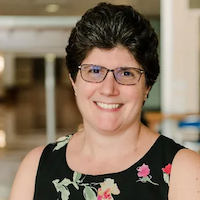- Home
- Fall 2024 Connections
- Archive
- Fall 2023 Connections
- Research Stories
- Nancy Kusmaul: Extending The Reach of The School’s Research Across The Human Lifespan
Nancy Kusmaul: Extending The Reach of The School’s Research Across The Human Lifespan

Nancy Kusmaul, PhD
Associate Professor
We use a champion team model, identifying and breaking down barriers, creating resources, and customizing a lot of the trauma-informed care that’s out there for the nursing home setting.Extending the reach of the school’s research across the human lifespan Nancy Kusmaul, PhD, an Associate Professor at the School’s BSW program located at the University of Maryland, Baltimore County, focuses her research expertise on nursing homes and their quality of life and care. “I have a specific interest in trauma-informed care,” says Kusmaul, who has spent many years as a member of the school’s distinguished faculty. “Trauma is not really on the radar of a lot of nursing home providers. I think this is a critical moment for nursing homes.”
To help address this significant care challenge and critical moment for the profession, Kusmaul is in the third year of an Oregon Community Foundation funded study in Oregon where they are working with nursing homes to help them introduce trauma-informed care. "We use a champion team model, identifying and breaking down barriers, creating resources, and customizing a lot of the trauma-informed care that’s out there for the nursing home setting.” Kusmaul adds, “There is not a lot of trauma-informed care with older adults, period. There is even less in institutionalized settings.”
Add to that lack of trauma-informed care, a kind of built-in social work shortage in nursing homes and the challenges take on an even greater sense of urgency. “It’s a long story, but nursing homes are one of the only places where there are Medicare and Medicaid funded services that a social worker does not need to have a degree in social work.” In addition, many of the Certified Nursing Assistants and others that work in nursing homes are low-wage workers. This, according to Kusmaul, creates a situation where “a population of at-risk low-wage workers are caring for an at-risk population where this not a lot of structural supports.”
The trauma-informed care principles of trustworthiness, empowerment, voice, choice, and collaboration need to play a larger role in nursing home care. According to Kusmaul, “These principles are important when it comes to trauma, but they are also important to person-centered care. Nursing homes are not great at this.”
Today, Kusmaul is finding through her research in Oregon that often the biggest barrier to change is change itself. “There is a lot of turnover in staff at the bottom and the top.” When you try to put in an educational intervention or something else it only gains as much momentum as it can before somebody leaves and we must start from scratch.” She adds, “Nursing homes are telling us they also need much smaller bites of training.”
Ten-minute training sessions are not uncommon. Kusmaul explains, “They need things they can do with staff because 10 minutes is all they have for a staff huddle or something else where they can give staff ‘just-a-bite' so that they can then go operationalize, practice, and play with.”
With this project now in its final year, Kusmaul states that they are taking all they have learned and “are looking to creating the resources and platform for nursing homes to be able to use. Creating those 10-minute nuggets but also some larger picture items by doing some of this ourselves or using other resources that already exist. In my mind, I see this as the foundation for trauma-informed care and then the advanced curriculum where we talk about advocacy and including residents and their families.”
As for the next steps, Kusmaul’s goal is to take the findings of this research study and leverage them into a larger federally funded project. “I am also working locally with UMB’s School of Nursing through an Alzheimer’s Association-funded project on person-centered care with people living with dementia in low-resource settings.”
Ready to be a Changemaker?
HAVE QUESTIONS FOR US?
Request InformationREADY TO START YOUR DEGREE?
Apply
